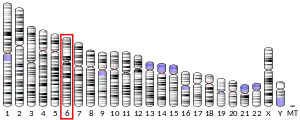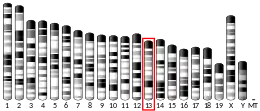| H2BC1 | |||||||||||||||||||||||||||||||||||||||||||||||||||
|---|---|---|---|---|---|---|---|---|---|---|---|---|---|---|---|---|---|---|---|---|---|---|---|---|---|---|---|---|---|---|---|---|---|---|---|---|---|---|---|---|---|---|---|---|---|---|---|---|---|---|---|
| |||||||||||||||||||||||||||||||||||||||||||||||||||
| Identifiers | |||||||||||||||||||||||||||||||||||||||||||||||||||
| Aliases | H2BC1, H2BFU, STBP, TSH2B, TSH2B.1, bA317E16.3, TH2B, histone cluster 1, H2ba, histone cluster 1 H2B family member a, hTSH2B, HIST1H2BA, H2B clustered histone 1 | ||||||||||||||||||||||||||||||||||||||||||||||||||
| External IDs | OMIM: 609904 MGI: 2448375 HomoloGene: 69356 GeneCards: H2BC1 | ||||||||||||||||||||||||||||||||||||||||||||||||||
| |||||||||||||||||||||||||||||||||||||||||||||||||||
| |||||||||||||||||||||||||||||||||||||||||||||||||||
| |||||||||||||||||||||||||||||||||||||||||||||||||||
| |||||||||||||||||||||||||||||||||||||||||||||||||||
| |||||||||||||||||||||||||||||||||||||||||||||||||||
| Wikidata | |||||||||||||||||||||||||||||||||||||||||||||||||||
| |||||||||||||||||||||||||||||||||||||||||||||||||||
Histone H2B type 1-A is a protein that in humans is encoded by the HIST1H2BA gene.[5][6][7]
Histones are basic nuclear proteins that are responsible for the nucleosome structure of the chromosomal fiber in eukaryotes. Nucleosomes consist of approximately 146 bp of DNA wrapped around a histone octamer composed of pairs of each of the four core histones (H2A, H2B, H3, and H4). The chromatin fiber is further compacted through the interaction of a linker histone, H1, with the DNA between the nucleosomes to form higher order chromatin structures. This gene is intronless and encodes a testis/sperm-specific member of the histone H2B family. Transcripts from this gene contain a palindromic termination element.[7]
References
- 1 2 3 GRCh38: Ensembl release 89: ENSG00000146047 - Ensembl, May 2017
- 1 2 3 GRCm38: Ensembl release 89: ENSMUSG00000050799 - Ensembl, May 2017
- ↑ "Human PubMed Reference:". National Center for Biotechnology Information, U.S. National Library of Medicine.
- ↑ "Mouse PubMed Reference:". National Center for Biotechnology Information, U.S. National Library of Medicine.
- ↑ Marzluff WF, Gongidi P, Woods KR, Jin J, Maltais LJ (Oct 2002). "The human and mouse replication-dependent histone genes". Genomics. 80 (5): 487–98. doi:10.1016/S0888-7543(02)96850-3. PMID 12408966.
- ↑ Zalensky AO, Siino JS, Gineitis AA, Zalenskaya IA, Tomilin NV, Yau P, Bradbury EM (Nov 2002). "Human testis/sperm-specific histone H2B (hTSH2B). Molecular cloning and characterization". J Biol Chem. 277 (45): 43474–80. doi:10.1074/jbc.M206065200. PMID 12213818.
- 1 2 "Entrez Gene: HIST1H2BA histone cluster 1, H2ba".
Further reading
- El Kharroubi A, Piras G, Zensen R, Martin MA (1998). "Transcriptional Activation of the Integrated Chromatin-Associated Human Immunodeficiency Virus Type 1 Promoter". Mol. Cell. Biol. 18 (5): 2535–44. doi:10.1128/mcb.18.5.2535. PMC 110633. PMID 9566873.
- Deng L, de la Fuente C, Fu P, et al. (2001). "Acetylation of HIV-1 Tat by CBP/P300 increases transcription of integrated HIV-1 genome and enhances binding to core histones". Virology. 277 (2): 278–95. doi:10.1006/viro.2000.0593. PMID 11080476.
- Deng L, Wang D, de la Fuente C, et al. (2001). "Enhancement of the p300 HAT activity by HIV-1 Tat on chromatin DNA". Virology. 289 (2): 312–26. doi:10.1006/viro.2001.1129. PMID 11689053.
- Strausberg RL, Feingold EA, Grouse LH, et al. (2003). "Generation and initial analysis of more than 15,000 full-length human and mouse cDNA sequences". Proc. Natl. Acad. Sci. U.S.A. 99 (26): 16899–903. Bibcode:2002PNAS...9916899M. doi:10.1073/pnas.242603899. PMC 139241. PMID 12477932.
- Mungall AJ, Palmer SA, Sims SK, et al. (2003). "The DNA sequence and analysis of human chromosome 6". Nature. 425 (6960): 805–11. Bibcode:2003Natur.425..805M. doi:10.1038/nature02055. PMID 14574404.
- Lusic M, Marcello A, Cereseto A, Giacca M (2004). "Regulation of HIV-1 gene expression by histone acetylation and factor recruitment at the LTR promoter". EMBO J. 22 (24): 6550–61. doi:10.1093/emboj/cdg631. PMC 291826. PMID 14657027.
- Gerhard DS, Wagner L, Feingold EA, et al. (2004). "The Status, Quality, and Expansion of the NIH Full-Length cDNA Project: The Mammalian Gene Collection (MGC)". Genome Res. 14 (10B): 2121–7. doi:10.1101/gr.2596504. PMC 528928. PMID 15489334.
- Li A, Maffey AH, Abbott WD, et al. (2005). "Characterization of nucleosomes consisting of the human testis/sperm-specific histone H2B variant (hTSH2B)". Biochemistry. 44 (7): 2529–35. doi:10.1021/bi048061n. PMID 15709765.
- Golebiowski F, Kasprzak KS (2007). "Inhibition of core histones acetylation by carcinogenic nickel(II)". Mol. Cell. Biochem. 279 (1–2): 133–9. doi:10.1007/s11010-005-8285-1. PMID 16283522. S2CID 25071586.
- Zhu B, Zheng Y, Pham AD, et al. (2006). "Monoubiquitination of human histone H2B: the factors involved and their roles in HOX gene regulation". Mol. Cell. 20 (4): 601–11. doi:10.1016/j.molcel.2005.09.025. PMID 16307923.
- Pavri R, Zhu B, Li G, et al. (2006). "Histone H2B monoubiquitination functions cooperatively with FACT to regulate elongation by RNA polymerase II". Cell. 125 (4): 703–17. doi:10.1016/j.cell.2006.04.029. PMID 16713563. S2CID 2614680.
- Kim SC, Sprung R, Chen Y, et al. (2006). "Substrate and functional diversity of lysine acetylation revealed by a proteomics survey". Mol. Cell. 23 (4): 607–18. doi:10.1016/j.molcel.2006.06.026. PMID 16916647.
This article is issued from Wikipedia. The text is licensed under Creative Commons - Attribution - Sharealike. Additional terms may apply for the media files.



